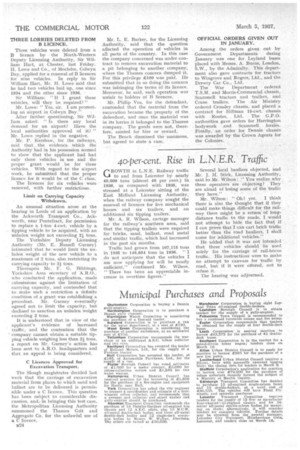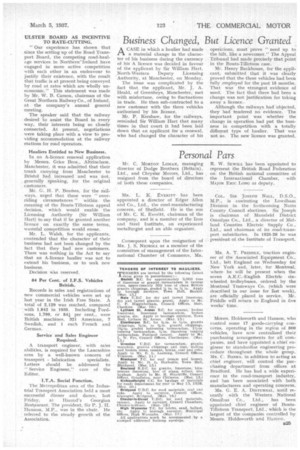4D-per-cent. Rise in L.N.E.R. Traffic G ROWTH in L.N.E. Railway traffic
Page 42

Page 43

If you've noticed an error in this article please click here to report it so we can fix it.
to and from Leicester by nearly 40,000 tons (almost 40 per cent.) in 1936, as compared with 1935, was 'stressed at a Leicester sitting of the East Midland Licensing Authority, when the railway company sought the renewal of licences for five mechanical horses and six trailers, and an additional six tipping trailers:
Mr. A. R. Wilson, cartage manager for the railway's southern area, said that the tipping trailers were required for bricks, sand, ballast, road metal and similar traffic, which had increased in the past six months.
Traffic had grown from 107,115 tons in 1935 to 146,654 tons in 1936. " I .do not anticipate that the vehicles I am now applying for will be nearly sufficient," continued Mr. Wilson. " There has been an appreciable increase in overtime figures."
Several local hauliers objected, and Mr, J. H. Stirk, Licensing Authority, said to Mr. Wilson: "You realize why these operators are objecting? They are afraid of losing some of the traffic they have."
Mr. Wilson: " Oh! yes. I think there is also the thought that if they could make things difficult for the railway there might be a return of longdistance traffic to the roads. I would not attempt to hide the fact that if I can prove that I can cart brick traffic better than the road hauliers, I shall come for additional vehicles."
He added that it was not intended that these vehicles should be used solely for the carriage of rail-borne traffic. His instructions were to make no attempt to canvass for traffic by road, but if it were offered, not to refuse it.
The hearing was adjourned. ULSTER BOARD AS INCENTIVE TO RATE-CUTTING.
" Our experience has shown that since the setting up of the Road Transport Board, the competing road-haulage services in Northern' Ireland have engaged in more active competition with each other in an endeavour to justify their existence, with the result that traffic is at present being conveyed by road at rates which are wholly uneconomic." This statement was made by Mr. W. B. Carson, chairman of the Great Northern Railway Co., of Ireland, at the company's annual general meeting.
The speaker said that the railway desired to assist the Board in every way, their interests being so closely connected. At present, negotiations were taking place with a view to providing accommodation at the railway stations for road operators.
Hauliers Entitled to New Business.
In an A-licence renewal application by Messrs. Grice Bros., Altrincham, Manchester, it was admitted that their trunk carrying from Manchester to Bristol had increased and was not,• generally speaking, for the original customers, Mr. G. H. P. Beannes, for the railways, urged that these were " overriding circumstances " within the meaning of the Bouts-Tillotson appeal decision, which would enable the Licensing Authority (Sir William Hart) to say that if he granted another licence on exactly the same terms, wasteful competition would ensue.
Mr. L. Walsh, •for the applicants, contended that the character of their business had not been changed by the fact that they had new customers. There was nothing in the Act to say that an A-licence haulier was not to extend his business, or to seek new business.
Decision was reserved.
84 Per Cent. of I.F.S. Vehicles British.
Records in sales and registrations of new commercial vehicles were set up last year in the Irish Free State. A total of 2,129 was reached, compared with 1,842 in 1935. Including Fordsons, 1,799, or 841 per cent., were British machines, 321 American, 7 Swedish, and 1 each French and German.
Service and Sales Engineer Required.
A transport engineer, with sales abilities, is required for the Lancashire area by a well-known concern of transport lubrication specialists. Letters should be addressed to " Service Engineer," care of the Editor.
I.T.A. Social Function.
The Metropolitan area of the Industrial Transport Association held a most successful dinner and dance, last Friday, at Ha.rrod's Georgian Restaurant. The president, Sir P. J. H. Hannon, M.P.., was in the chair. He referred to the steady growth of the Association.




































































































